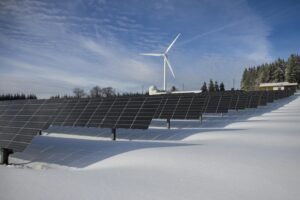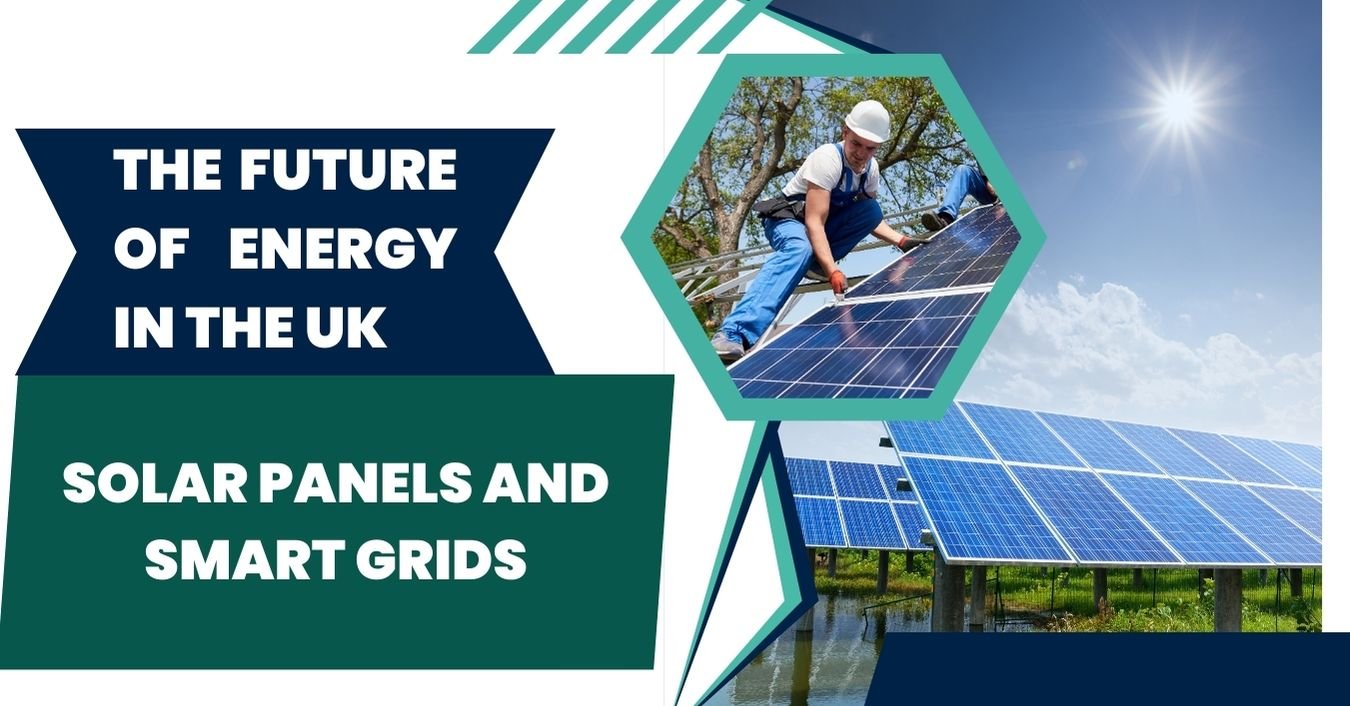Introduction
The UK energy scene is about to change. The emphasis on renewable energy has never been more intense as the demand to lower carbon emissions and substitute other fuels rises. Leading this change are solar panels and smart grids, which provide greener, more effective electricity. These technologies promise to improve grid stability as well as to lower energy prices. Knowing how solar panels and smart grids cooperate is crucial as the UK wants a sustainable future. In this paper, we investigate their possibilities and their part in revolutionizing the energy industry.
1. Current Energy Challenges in the UK
As it moves toward a cleaner future, the UK has major energy issues. Dependent too much on fossil fuels, including natural gas and oil, has resulted in varying energy prices and questions regarding long-term energy security. Further strains on the current infrastructure are the rising demand for electricity and the necessity to reach tight carbon reduction goals. The nation has to change to more dependable and sustainable energy sources under growing pressure to lower greenhouse gas emissions. Attaching a robust and low-carbon energy future depends on addressing these obstacles.
2. What Are Solar Panels?
Photovoltaic (PV) technology drives solar panels to translate sunlight into electricity. Solar cells gather sunlight and convert it into usable energy for houses, companies, and even the national grid. Solar energy has become somewhat popular in the UK because of its environmental advantages and the possibility to lower power costs. Along with a better energy supply, solar panels give consumers some degree of energy independence. More homes and companies are using solar electricity to save money and help to create a cleaner future as the government pushes renewable energy.
3. The Smart Grid: A New Era of Energy Management

A smart grid is a sophisticated energy network designed to monitor, regulate, and maximize electrical flow by use of digital technologies. Unlike conventional systems, smart grids can effectively control energy from many sources, including renewable energy like solar power. They offer real-time energy management and improved demand response by two-way communication between consumers and utilities, therefore enabling A key component of the UK’s move toward a more sustainable energy system, smart grids boost grid dependability, lower energy waste, and increase efficiency. This technology makes it possible for renewable energy to be seamlessly included in the grid, therefore enabling a more flexible and strong power network.
4. Integration of Solar Panels with Smart Grids
Together, smart grids and solar panels produce a flexible and more efficient energy source. Smart networks assist control the flow of surplus electricity produced by solar panels either storing it in batteries for later use or distributing it to other regions in need. A better balance of supply and demand made possible by this integration helps to lower energy waste and stop grid overloads. Smart meters are absolutely important since they let homeowners track their energy consumption and help to maintain system stability. The UK may increase energy dependability and hasten its change toward renewable power sources by tying solar energy with smart networks.
5. The Role of AI and Machine Learning in Smart Grids
Through increased efficiency and dependability, artificial intelligence and machine learning are transforming the way smart grids run. These technologies enable the grid to change in real-time to match changes in energy consumption, therefore helping to forecast patterns of demand. Did you know Open AI launches revolutionizing Search Gpt? By optimizing the way solar panels distribute electricity, artificial intelligence (AI) can also guarantee the correct quantity of energy is delivered where most needed. Because machine learning techniques spot possible grid problems before they produce outages, the energy system becomes more robust. Incorporating artificial intelligence into smart grids will help the UK to control renewable energy and keep a reliable, effective system.
6. Government Policies and Initiatives Supporting Solar and Smart Grids in the UK
Several initiatives the UK government has put in place help to encourage smart grid technology and solar energy usage. Important programs include incentives and subsidies for solar panel installation under the Feed-in Tariff (FiT) and Smart Export Guarantee (SEG), which honor homes and companies for producing renewable energy. Furthermore driving investments in smart grid infrastructure is the government’s dedication to reach net-zero carbon emissions by 2050. These rules seek to hasten the switch to renewable energy, therefore increasing the availability of solar power and supporting the creation of sophisticated energy systems like smart grids.
7. Challenges to Widespread Adoption
Although solar panels and smart grids have many advantages, some difficulties prevent their general acceptance. Technical challenges include combining solar energy with current grid architecture and controlling its sporadic character. Still expensive and not yet widely available are energy storage options like batteries. Economically, the initial outlay for solar technologies and smart grid enhancements can be somewhat large, therefore discouraging some buyers. There are also political and societal challenges including opposition to change and the necessity of significant policy support. Realizing the whole potential of these technologies depends on overcoming these obstacles.
8. Case Studies: Successful Implementation of Solar and Smart Grids in the UK
Numerous UK examples highlight how effectively smart grids and solar panels are integrated. The “Energise Barnsley” initiative, which blends solar panels with smart grid technology to improve energy efficiency and assist local renewable energy generation, is one such. Another noteworthy example is “London’s Solar Strategy,” which seeks to raise solar capacity all across the city by use of smart grid technology to properly control energy distribution. Furthermore, the “Community Energy Scheme” in Scotland shows how nearby towns are lowering energy prices and boosting sustainability by means of solar panels and smart grids. These case studies underline the useful advantages and increasing acceptance of these technologies all throughout the United Kingdom.
9. The Future of Energy in the UK
Looking ahead, smart grids and solar panels are likely to be quite important for the energy future of the UK. As technology develops and investments rise, solar energy is likely to take the front stage in the energy mix offering a cleaner, more consistent source of power. Smart grids will keep changing to become better in integrating several energy sources and raising system efficiency. With more focus on sustainability and energy independence, the future energy scene will probably show a more dispersed and robust system. Achieving the long-term environmental targets for the UK and guaranteeing a steady energy supply depends on accepting these technologies.
Conclusion
Ultimately, on the UK’s path toward a sustainable energy future, solar panels and smart grids mark a pivotal development. While smart grids improve the efficiency and dependability of energy delivery, solar panels provide a pure and progressively reasonably priced source of electricity. Combined, they handle important issues including controlling energy demand and lowering carbon emissions. The UK draws closer to reaching its renewable energy targets and guaranteeing a more resilient energy grid as it keeps spending in these technologies. A cleaner, more sustainable future depends on our embracing these inventions.

